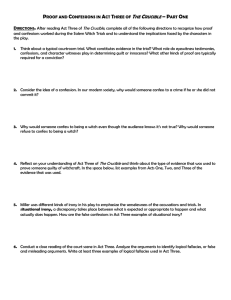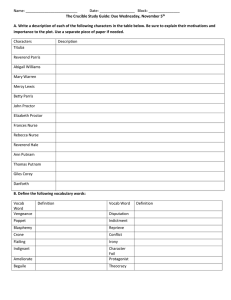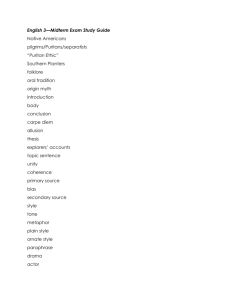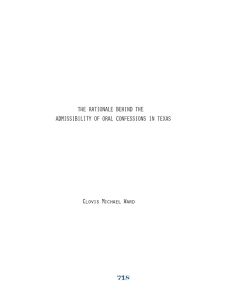THE CRUCIBLE: Proof and Confessions
advertisement
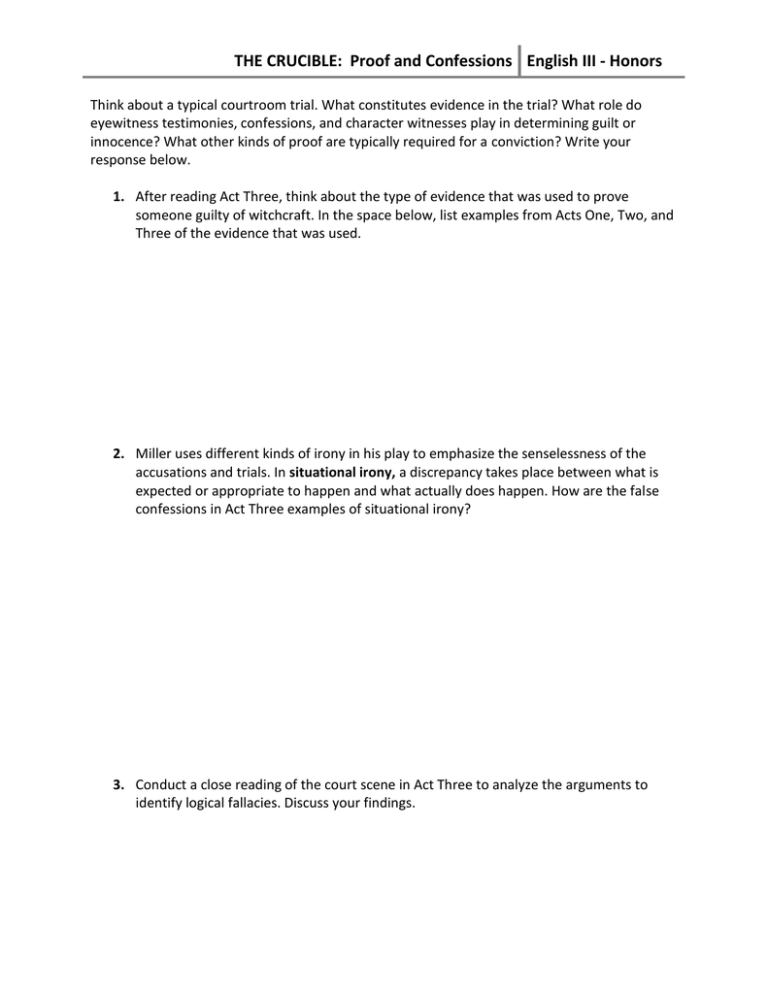
THE CRUCIBLE: Proof and Confessions English III - Honors Think about a typical courtroom trial. What constitutes evidence in the trial? What role do eyewitness testimonies, confessions, and character witnesses play in determining guilt or innocence? What other kinds of proof are typically required for a conviction? Write your response below. 1. After reading Act Three, think about the type of evidence that was used to prove someone guilty of witchcraft. In the space below, list examples from Acts One, Two, and Three of the evidence that was used. 2. Miller uses different kinds of irony in his play to emphasize the senselessness of the accusations and trials. In situational irony, a discrepancy takes place between what is expected or appropriate to happen and what actually does happen. How are the false confessions in Act Three examples of situational irony? 3. Conduct a close reading of the court scene in Act Three to analyze the arguments to identify logical fallacies. Discuss your findings. THE CRUCIBLE: Proof and Confessions English III - Honors THE CRUCIBLE: Proof and Confessions English III - Honors Writing Prompt: Write a script for your scene and assign roles. Then rehearse the scene and perform it for the class. Scenario A: Needs three characters You and a friend steal the answer key to a big test. The two of you use the answer key to study the night before. Your friend, who is in a class period before you, gets away with the cheating, but you get caught with a cheat sheet. The teacher tells you that you will receive a 0 on the test, and you will be sent to the principal for possible expulsion if you do not tell who else cheated with you. What will you do? Scenario B: Needs at least four characters You are an accountant for a big corporation. Your boss gives you permission to make some transactions that are possibly illegal. When you are investigated by the police, you are told that they do not care about prosecuting you, but they really want to get your boss. If you say that your boss told you to make these transactions, you will not be prosecuted, but if you do not, you could face up to six months in jail and lose your license as an accountant. When you told your coworker about this, he or she said that if you do tell on your boss, you probably would not be able to find work as an accountant again. What will you do? Scenario C: Needs at least three characters You donated money to an environmental group last year. You attended one of its meetings six months ago but did not get actively involved. Last week, you heard that a member of the group blew up logging equipment to protest logging in the area. The FBI arrested that person, but it wants to collect the names of everyone involved in the group so that it can prevent further actions. The FBI agent tells you that you have to give him the names of all of the people at the meeting you attended. If you do not give him the names, you will be held in contempt and you could be put in jail until you give him the names. What will you do? Scenario D: Needs at least two characters After 9/11, a number of Arab-Americans and other foreign-born citizens and residents were questioned by the FBI. Imagine that you are one of these people. The FBI told you that you would be deported unless you give the names of other Arab-Americans you know, including some of your own family members. If you give the FBI these names, others will find themselves in the same position in which you find yourself. What will you do?
